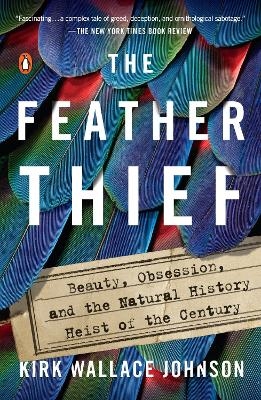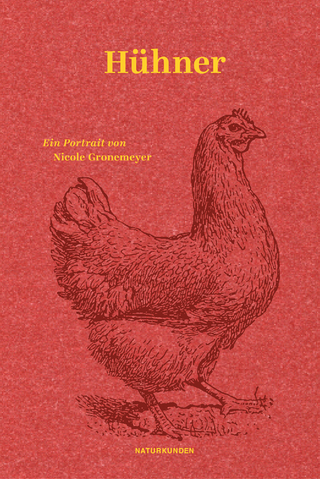
The Feather Thief
Penguin USA (Verlag)
978-1-101-98163-4 (ISBN)
“Absorbing . . . Though it's non-fiction, The Feather Thief contains many of the elements of a classic thriller.” —Maureen Corrigan, NPR’s Fresh Air
“One of the most peculiar and memorable true-crime books ever.” —Christian Science Monitor
From the author of The Fishermen and the Dragon, a rollicking true-crime adventure and a captivating journey into an underground world of fanatical fly-tiers and plume peddlers, for readers of The Stranger in the Woods, The Lost City of Z, and The Orchid Thief.
On a cool June evening in 2009, after performing a concert at London's Royal Academy of Music, twenty-year-old American flautist Edwin Rist boarded a train for a suburban outpost of the British Museum of Natural History. Home to one of the largest ornithological collections in the world, the Tring museum was full of rare bird specimens whose gorgeous feathers were worth staggering amounts of money to the men who shared Edwin's obsession: the Victorian art of salmon fly-tying. Once inside the museum, the champion fly-tier grabbed hundreds of bird skins—some collected 150 years earlier by a contemporary of Darwin's, Alfred Russel Wallace, who'd risked everything to gather them—and escaped into the darkness.
Two years later, Kirk Wallace Johnson was waist high in a river in northern New Mexico when his fly-fishing guide told him about the heist. He was soon consumed by the strange case of the feather thief. What would possess a person to steal dead birds? Had Edwin paid the price for his crime? What became of the missing skins? In his search for answers, Johnson was catapulted into a years-long, worldwide investigation. The gripping story of a bizarre and shocking crime, and one man's relentless pursuit of justice, The Feather Thief is also a fascinating exploration of obsession, and man's destructive instinct to harvest the beauty of nature.
Kirk W. Johnson is the author of The Fishermen and the Dragon and To Be a Friend Is Fatal, and the founder of the List Project to Resettle Iraqi Allies, which he started after serving with USAID in Fallujah. His writing has appeared in The New Yorker and The New York Times, and on This American Life, among others.
PROLOGUE By the time Edwin Rist stepped off the train onto the platform at Tring, forty miles north of London, it was already quite late. The residents of the sleepy town had finished their suppers; the little ones were in bed. As he began the long walk into town, the Midland line glided off into darkness. A few hours earlier Edwin had performed in the Royal Academy of Music's "London Soundscapes," a celebration of Hayden, Handel, and Mendelssohn. Before the concert, he'd packed a pair of latex gloves, a miniature LED flashlight, a wire cutter, and a diamond-blade glass cutter in a large rolling suitcase, and stowed it in his concert hall locker. He bore a passing resemblance to a lanky Pete Townshend: intense eyes, prominent nose, and a mop of hair, although instead of shredding a Fender, Edwin played the flute. There was a new moon that evening, making the already-gloomy stretch of road even darker. For nearly an hour, he dragged his suit- case through the mud and gravel skirting the road, under gnarly old trees strangled with ivy. Turlhanger's Wood slept to the north, Chestnut Wood to the south, fallow fields and the occasional copse in between. A car blasted by, its headlights blinding. Adrenaline coursing, he knew he was getting close. The entrance to the market town of Tring is guarded by a sixteenth-century pub called the Robin Hood. A few roads beyond, nestled between the old Tring Brewery and an HSBC branch, lies the entrance to Public Footpath 37. Known to locals as Bank Alley, the footpath isn't more than eight feet wide and is framed by seven-foot-high brick walls. Edwin slipped into the alley, into total darkness. He groped his way along until he was standing directly behind the building he'd spent months casing. All that separated him from it was the wall. Capped with three rusted strands of barbed wire, it might have thwarted his plans were it not for the wire cutter. After clearing an opening, he lifted the suitcase to the ledge, hoisted himself up, and glanced anxiously about. No sign of the guard. There was a space of several feet between his perch on the wall and the building's nearest window, forming a small ravine. If he fell, he could injure himself-or worse, make a clamor that would summon security. But he'd known this part wouldn't be easy. Crouched on top of the wall, he reached toward the window with the glass cutter and began to grind it along the pane. Cutting glass was harder than he had anticipated, though, and as he struggled to carve an opening, the glass cutter slipped from his hand and fell into the ravine. His mind raced. Was this a sign? He was think- ing about bailing on the whole crazy scheme when that voice, the one that had urged him onward these past months, shouted Wait a minute! You can't give up now. You've come all this way! He crawled back down and picked up a rock. Steadying himself atop the wall, he peered around in search of guards before bashing the window out, wedging his suitcase through the shard-strewn opening, and climbing into the British Natural History Museum. Unaware that he had just tripped an alarm in the security guard's office, Edwin pulled out the LED light, which cast a faint glow in front of him as he made his way down the hallways toward the vault, just as he'd rehearsed in his mind. He wheeled his suitcase quietly through corridor after corridor, drawing ever closer to the most beautiful things he had ever seen. If he pulled this off, they would bring him fame, wealth, and prestige. They would solve his problems. He deserved them. He entered the vault, its hundreds of large white steel cabinets standing in rows like sentries, and got to work. He pulled out the first drawer, catching a waft of mothballs. Quivering beneath his fingertips were a dozen Red-ruffed Fruitcrows, gathered by natural- ists and biologists over hundreds of
| Erscheinungsdatum | 17.04.2019 |
|---|---|
| Zusatzinfo | 16-PAGE 4-COLOR INSERT (ON INSERT STOCK) |
| Sprache | englisch |
| Maße | 138 x 212 mm |
| Gewicht | 289 g |
| Themenwelt | Literatur ► Biografien / Erfahrungsberichte |
| Literatur ► Briefe / Tagebücher | |
| Literatur ► Krimi / Thriller / Horror | |
| Sachbuch/Ratgeber ► Natur / Technik ► Naturführer | |
| Reisen ► Reiseführer | |
| Reisen ► Sport- / Aktivreisen | |
| ISBN-10 | 1-101-98163-6 / 1101981636 |
| ISBN-13 | 978-1-101-98163-4 / 9781101981634 |
| Zustand | Neuware |
| Informationen gemäß Produktsicherheitsverordnung (GPSR) | |
| Haben Sie eine Frage zum Produkt? |
aus dem Bereich


